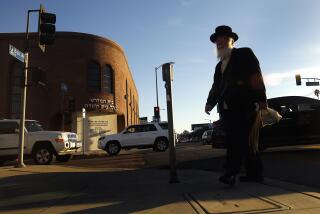Learning Experience : Ethiopian Israelis and L.A. Teens Build Understanding in Program
NORTH HOLLYWOOD — William Lambert was watching television in 1992 when the idea came into focus that brought foreign visitors to North Hollywood High this week.
Lambert had already been thinking about race relations when images of rioting between blacks and Jews in the Crown Heights section of Brooklyn, N.Y., flashed on the screen. He realized then how few Americans realize that some people are both.
The result of Lambert’s efforts is Children of the Dream, a program in its fifth year of bringing small groups of black Israeli teenagers, of Ethiopian descent, to Los Angeles and other cities, and sending American youths overseas.
Ten Ethiopian teenagers and a chaperone are spending a couple of days at Valley schools this week in the middle of a two-week L.A. stay.
“We try to show that Jews need not be considered just one color,” said Marjorie Green, education director of the Anti--Defamation League of B’nai B’rith, which runs the program.
Under the shade trees behind North Hollywood High on Monday, the visitors mingled with the students, comparing stories about traveling great distances with their families to strange countries. The two groups swapped experiences, covering topics from race to basketball, while sitting cross-legged on the lawn.
“We didn’t want them to be display pieces,” said teacher Deb Bowers, whose combined English and social studies classes welcomed the Ethiopians on Monday. “Arranging chairs in a circle around them would only make them nervous.”
The program has enabled students from both countries to develop a mutual respect.
“I didn’t take [history] seriously. I just studied it, made sure my work was in on time,” said Monica Matus, 17, a North Hollywood senior. Monica was one of nine L.A. teens to visit Israel in April.
“But when I started in this program, meeting all these people who took all this trouble to get to Israel, it really made a difference.”
While others in the Israeli group stopped Monday at Francis Polytechnic High School in Sun Valley and Sherman Oaks Center for Enriched Studies, Avi Tayaga, Tamar Akale and Mali Mantasnot toured North Hollywood. Avraham Adgah, 31, traveled along as their chaperone.
They planned to go to Disneyland on Monday night and return to the Valley today to meet Jewish and black student groups at Cal State Northridge.
Between lunch and a game of pickup basketball, the Ethiopians joined students for activities designed to highlight the diversity of the school and the city. The group played a type of bingo which entailed finding other members of the class who fit descriptions such as “likes banda music” or “has Moslem friends.”
Valley students took turns discussing their family origins in Honduras, the Dominican Republic and Armenia, bringing out the Israelis’ memories of their own immigrant experiences.
“When I was 5 years old, my family went to Israel,” Avi, 17, told the group after listening to other accounts. “We traveled a long way.”
Most of the 56,000 Ethiopian Jews in Israel fled oppression in their native country aided by two major rescue efforts by the Israeli government: Operation Moses in 1984-85 and Operation Solomon in 1991.
Life in Israel has been an improvement, many say, but social workers there say Ethiopian Jews are often discriminated against by white Jews.
In January, Ethiopian Jews protested outside the prime minister’s office, resulting in a clash that injured 60 protesters and police officers, primarily over the revelation that Israeli blood banks were routinely discarding donations by Ethiopians because they were presumed more likely to have AIDS.
But both Israeli and American teenagers agreed that racial discrimination is worse in the United States. “Over there, they talk to people and make friends with other groups,” Monica said. “But [in school] over here, you’ll see white people on this side of the room, a black group over there.”
“We have the same problems,” said Adgah, comparing Israel and the United States. “Lots of people from different cultures mixing together.”
Participants say the true value of the program lies in the enlightened perspective they take home. Even if they never return to visit, both groups can keep up with each other, mindful of the human beings behind stories and stereotypes, they say.
“You grow up” and become more mature under the influence of the program, Monica said. “I never had read newspapers or paid attention to the news before. Now it’s CNN all the time. I want to know all I can.”
More to Read
Sign up for The Wild
We’ll help you find the best places to hike, bike and run, as well as the perfect silent spots for meditation and yoga.
You may occasionally receive promotional content from the Los Angeles Times.






